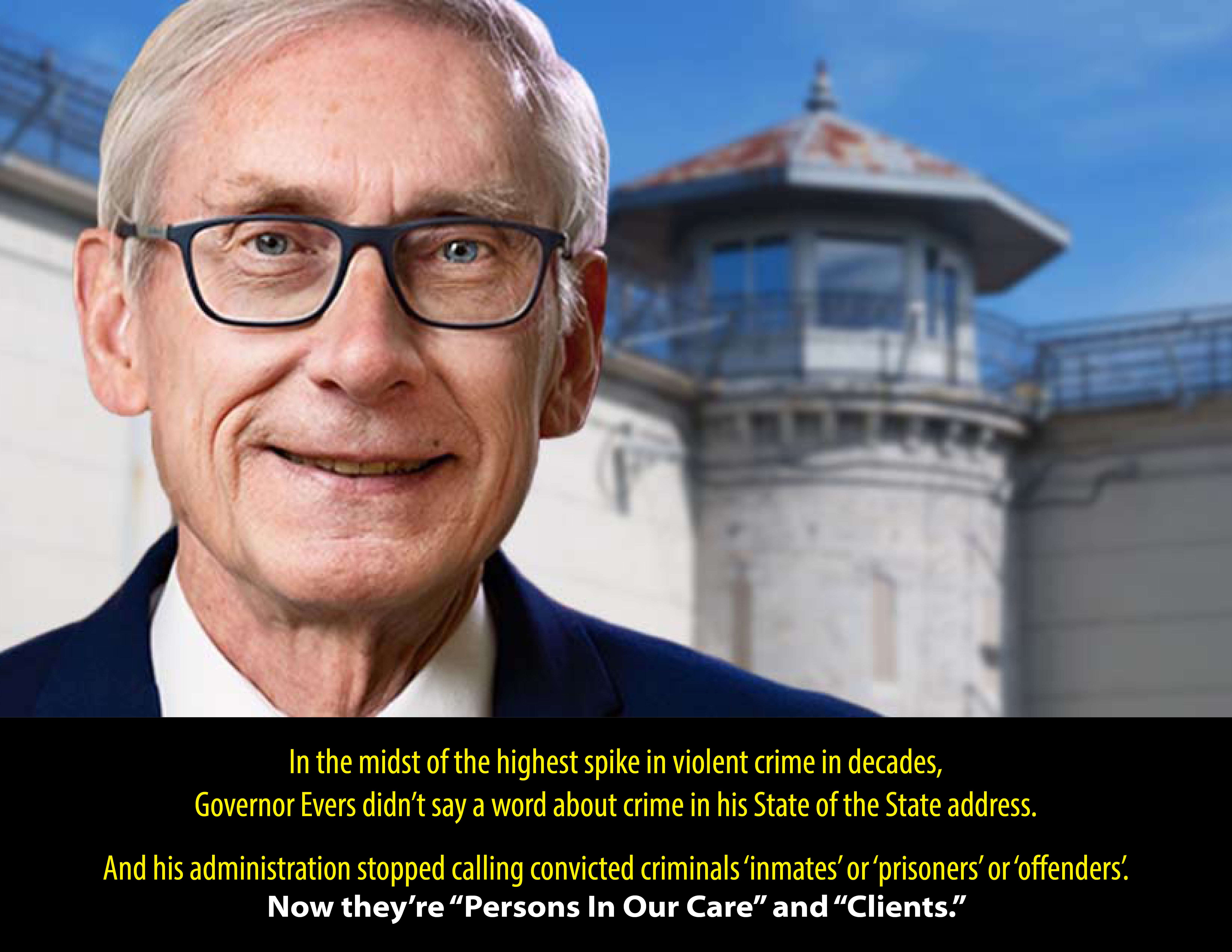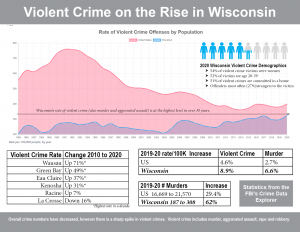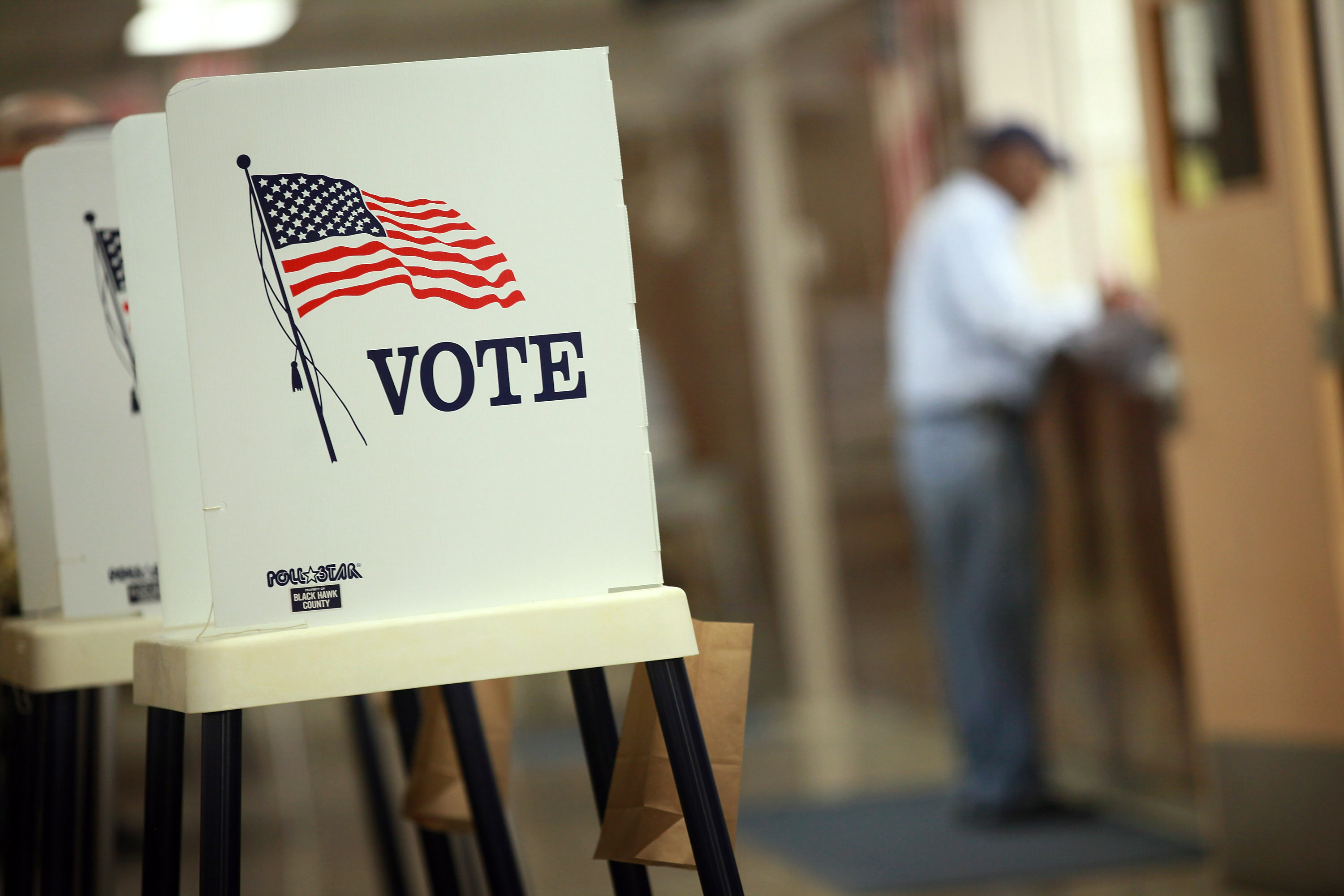
By Heather Smith
1/30/2022 Wauwatosa

Two 20-year-old women shot a waiter in the face, and then stomped on his face, because their hamburgers were slow being served.
2/20/2022 Waukesha
A 43-year-old man viciously assaulted his elderly parents in front of his young son apparently over a bacon-cooking dispute.
2/25/2022 Milwaukee

A 23-year-old man opened fire inside a Milwaukee Police
department lobby.
2/22/2022 Green Bay

A 24-year-old woman, on probation, strangled and then dismembered
a sexual partner she’d spent the day smoking meth with,
leaving his head in a bucket in his mother’s basement.
3/1/2022
“Enough is enough.” Tony Evers
Is Tony Evers finally weighing in on the violent crime spike that is rocking our communities, saying we’ve had enough violence, and he’s ready to do something about it?
Nope.
What pushed Evers to draw a line in the sand, to speak up and demand an end, was not violence but talk about cleaning up elections, because gosh darnit, that just gets on his last dang nerve.
Most of us are worried about the surging rate of violent crime – homicides are up 62% in Wisconsin. People are being shot over burgers, beaten over bacon, and beheaded into buckets right in our backyards. We’re concerned about the safety of our families and our compassion is for the victims of crime, not the perpetrators.
Criminals Before Victims
But that’s not who Tony Evers is in his heart or in his policies. This governor’s gut reaction to horrific crime is not empathy for the victim or the victim’s family, it’s concern for the criminal.
After the Christmas Parade murders, Evers coolly told people to “take a breath” before strengthening laws to prevent future tragedies.

In stark contrast, after Jacob Blake was shot – armed, resisting arrest, and with an active warrant for a rape charge – Evers passionately condemned the police, not the criminal, saying Blake was not the first Black man to have been “shot or injured or mercilessly killed” at the hands of law enforcement.
A Busy Guy
When asked when or if he’d met with families of murder victims, Evers blunder-mumbled that he wasn’t sure, because he has a busy schedule, but he had on “the Waukesha occasion.” Then after some off-stage cueing from his staff, he mentioned the many pardons he has given, suggesting he’s pardoned a number of murderers and spoken to the victims’ families?
The video clip of this is worth a watch – it has to be seen to be believed. Kudos to A.J. Bayatpour of WKOW’s Capital City Sunday program for asking the Governor a legitimate policy question that wasn’t a softball.
The governor has been a busy guy when it comes to making things easier for criminals:
-
- Working toward his goal of slashing prison populations by half
- Pardoning over 400 offenders, more than any other Wisconsin governor
- Proposing a complete overhaul of the state’s criminal justice code
- Vetoing a legislative package of ‘tougher on crime’ bills
- Avoiding taking a position on bail reform
Back on the Street
Evers campaigned on releasing 50% of the prison population. In support of the policy, he persisted in using a pants-on-fire-false statistic, claiming 75-85% of inmates were in prison for drug crimes. In truth, violent criminals today account for over 70% of our prison population while only about 11% have a drug offense as their most serious crime.

As we’ve covered before, the stat was completely fabricated as a talking point for policy initiatives like emptying prisons, legalizing marijuana, and solving racial disparities. What wasn’t fabricated was his desire to get violent criminals out of jail. When the prison population is 70% violent criminals, there’s no way to release half the prisoners without releasing several thousand violent felons.
During Evers’ term, our prison population has plummeted to its lowest point since the 1990s and is currently 15% lower than it was in December 2018. Evers also increased the number of early release prisoners by 16%.
Evers has changed the way DOC handles revocations for criminals on extended supervision in the community to keep the prison population down. Offenders previously had to abide by rules including adhering to treatment programs and complying with supervision while serving the extended supervision portion of their sentence. Evers softened up these rules, changing guidelines to avoid revoking supervision and returning to jail convicts who refuse to comply with rules for their release.
It’s a tool meant to trick. When revocation numbers are down, it appears to the public as though offenders are integrating well back into society. In reality expectations for responsible behavior have been eliminated.
It’s the same trick DPI used recently when they quietly changed the grading curve for school report cards so more schools appeared to be doing better. These are simply strategies to make it hard for anyone to find the truth.
Old Enough to Know Better
Evers’ last budget contained a complete overhaul of the criminal code, dumping Truth in Sentencing, reducing sentences, expanding early release along with a host of other soft-on-crime initiatives.
One of the least-covered items was a provision to specifically look at sentence reductions for criminal adults as old as 25.
Such a plan would have meant the accused mentioned at the top of this piece could have received shortened sentences for being too young to fully understand that decapitation and face-shooting are not very nice things to do.
This infantilization of adults criminals is quite the contrast to the view of Evers’ party and the education establishment of which he is a leader, that K12 children of any age are old enough to “choose” their gender. In fact, although there is an injunction on Madison schools to prevent them from lying to parents about their children, the district responded with guidance urging teachers to refuse to answer parents instead.
Remember the MMSD “If asked, don’t tell” policy?

Out (of touch) On Bail
The Waukesha parade tragedy brought the problem of low bail into clear focus and the legislature passed a resolution on a bipartisan vote in both houses, beginning the process to amend the state constitution to require public safety to be considered when setting bail.
Wisconsin Democrats have a long history opposing cash bail. Mandela Barnes authored legislation in 2016 to eliminate cash bail entirely in the state. Barnes didn’t come out from wherever he’s been hiding to personally comment, but his staff says he supports ending cash bail on a national level.
President Biden supports ending cash bail, as part of his National Strategy on Gender Equity and Equality, claiming it harms Black women, though it’s hard to imagine cash bail is more harmful than violent crime, and in Wisconsin, most victims of violent crime are women.
But so far Evers can’t – or won’t – give a position bail reform other than to say he wants “all parties” involved in the decision. He doesn’t specify which parties he wants to be consulted with, but it’s a fair guess he believes criminals figure heavily in this conversation.
He’s also quite worried about making a mistake that would need fixing with follow-up legislation. The second part of this interview is just as cringeworthy as the first.
It doesn’t seem to have occurred to Evers that a mistake like Brooks’ low bail left people dead, and that cannot be fixed.
Evers also refused to say whether he supported Barnes’ plan to end cash bail entirely claiming he didn’t have enough input.
Here are a couple of pieces of input:
- A man who ran over his girlfriend with his vehicle was released on what even soft-on-crime DA Chisholm characterized as inappropriately low bail of $1,000 and then used the same deadly weapon to drive through a Christmas parade, killing 6 and injuring over 60. His current $5 million bail is keeping him behind bars, where he can’t kill again. People are safer, especially the witness he tried to intimidate.
- A man with 4 felony cases against him, out on bail, was arrested for the murder 11-year-old Anissa Scott. She would have been safer if he had stayed behind bars.
Department of Corrections’ Clients
Evers’ bias toward criminals goes way beyond his statements. permeating his administration.
DOC and DHS have altered the language they use for criminals to reflect a “person-first” approach. Person-first language is part of a justice reform effort to humanize criminals by discontinuing the use of harmful, negative labels that make it harder for people to live and thrive.
A recent effort in Colorado to stop using the term ‘sex offender’ was supported by sex offenders who found the label “downright offensive” and preferred the term “client.” In a controversial decision, they ultimately voted to adopt the more woke term “adults who commit sex offenses.”
The Evers Administration has quietly put Colorado’s effort to shame.
They’ve taken the crime out of criminal backgrounds by switching to sanitized, person-first terminology departmentwide on forms, reports, data dashboards, webpages, brochures, and contracts.
Reports that formerly tracked “Inmate Population”
now report on “Persons In Our Care”.
“Offenders” are now “clients.”
For example, in June 2020 there were 76% more DOC “clients” who committed sex crimes “client monitoring” in the community as an “alternative to incarceration” than there were in June 2017.
In the archaic language of the unwoke that translates to “There are way more rapists on the streets instead of behind bars since Evers took office.”
By golly, that sounds gosh darn unsafe.
It would be easy to think Evers is simply afraid to upset his base going into 2018 by taking even one stance against violent criminals running riot, but that doesn’t ring true. It’s clear that this is something Evers deeply, personally believes in, and he isn’t making a political calculus.
All of Evers’ actions, the policy changes, the language changes – they all have one goal: to minimize, soften, sanitize and mainstream the facts, figures, and dangers that criminals represent. It goes like this:
If everyone is in jail just because they smoked pot once, then gosh, it’s expensive and silly to spend all that money.
If every client in the corrections systems is just a nice person who may have suffered a conviction then golly, maybe our sentences are too tough.
If rapists suffer from low self-esteem because they’re called sex offenders, then goodness, maybe we shouldn’t be so mean.
If everyone under the age of 25 is too young to know right from wrong, shucks, we probably shouldn’t hold them accountable.
If every victim is emotional, then gee whiz, they just need to take a deep breath and think about how hard it must be on the criminals.
Changing the language and changing the rules changes the narrative. And the narrative that Evers is pushing is that the people who need and deserve our care sympathy are the murderers, the rapists, the decapitators, and everyone who is just so hungry they have to shoot someone in the face because their burger is taking too long.
The rest of us need to just stop being so gosh darn hysterical, take a few deep breaths, and have a little human decency about the plight of the criminal.





